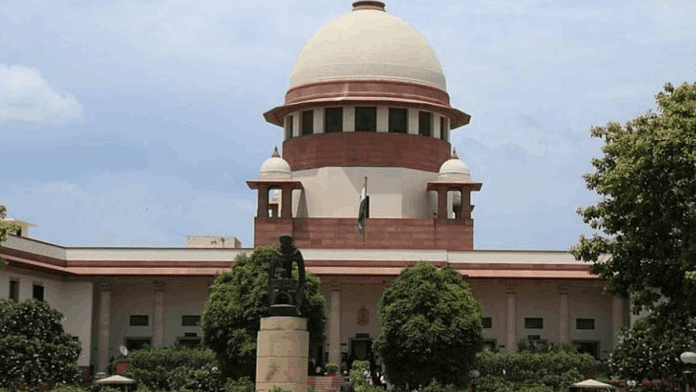New Delhi: The Supreme Court on Thursday directed the Election Commission of India (ECI) to produce before it in sealed cover the “up to date” data of funds received by political parties through electoral bonds till September 30, 2023.
A five-judge constitution bench headed by Chief Justice D Y Chandrachud referred to the April 12, 2019 interim direction passed by the apex court directing political parties to furnish the details of funds received by them through electoral bonds to the poll panel in a sealed cover.
The bench, also comprising Justices Sanjiv Khanna, B R Gavai, J B Pardiwala and Manoj Misra, said the April 2019 order was not restrictive to the date on which it was pronounced, and if there was any ambiguity, it was necessary for the poll panel to seek a clarification from the top court.
While hearing arguments on a batch of petitions challenging the validity of the electoral bonds scheme for funding political parties, the bench observed the ECI should have the up to date data.
“In any event, we now direct that the Election Commission shall produce up to date data until September 30, 2023 in terms of the interim direction which was issued on April 12, 2019,” the bench ordered.
It said the exercise be carried out within two weeks and data handed over to the registrar (judicial) of the apex court in a sealed cover.
The bench reserved its verdict on the petitions, including those filed by Congress leader Jaya Thakur, the Communist Party of India (Marxist) and NGO Association for Democratic Reforms (ADR), after hearing arguments for three days.
During the hearing, the bench asked the EC’s counsel about the quantum of electoral bonds which have been subscribed.
The EC’s counsel said he had some data in terms of the April 2019 order in a sealed cover and he can place that before the court.
“Is the data up to date, at least till March 2023?” the bench asked.
The counsel referred to the April 2019 order of the apex court and said the details were till 2019 only.
“You have to continue to collect the data,” the bench said, adding, the EC never came back to the court for clarification if there was any doubt regarding the earlier directive.
“You should have got the data when you were coming to the court… That day we had emphasised and all of us had expressed the view and we expected you to come back with the data,” the bench told the EC’s counsel.
The counsel said he can provide the data and the EC can seek details from all political parties.
The bench said it will not ask the State Bank of India to reveal the identity of the donors at this stage but it would like to know about the quantum of bonds subscribed.
“What is time frame in which data has to be given every year? Is it every financial year? What is the deadline?” the bench asked.
The counsel informed the court the data was to be given six months after a financial year got over.
“You ought to have the data. You will have the total quantum of electoral bonds and what is the bifurcation between different political parties,” it told the EC’s counsel, who said the poll panel will have to collate that.
“File the data as of March 31, 2023 and submit it to us. You can even give us the data till September 30, 2023,” the bench told the lawyer.
In its April 2019 order, the top court, which had not stayed the Centre’s Electoral Bond Scheme, 2018, made it clear it would accord an in-depth hearing to the pleas as the Centre and the EC have raised “weighty issues” having “tremendous bearing on the sanctity of the electoral process in the country”.
“According to us, the just and proper interim direction would be to require all the political parties who have received donations through electoral bonds to submit to the Election Commission of India in sealed cover detailed particulars of the donors as against each bond; the amount of each such bond and the full particulars of the credit received against each bond, namely, the particulars of the bank account to which the amount has been credited and the date of each such credit,” it had said.
The scheme, which was notified by the government on January 2, 2018, was pitched as an alternative to cash donations made to political parties as part of efforts to bring in transparency in political funding.
According to the provisions of the scheme, electoral bonds may be purchased by any citizen of India or entity incorporated or established in India. An individual can buy electoral bonds, either singly or jointly with other individuals.
Only the political parties registered under Section 29A of the Representation of the People Act, 1951 and which secured not less than 1 per cent of the votes polled in the last election to the Lok Sabha or a state legislative Assembly are eligible to receive electoral bonds.
According to the notification, electoral bonds shall be encashed by an eligible political party only through an account with an authorised bank. PTI ABA ABA SK SK
This report is auto-generated from PTI news service. ThePrint holds no responsibility for its content.



